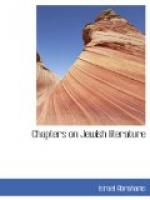From another point of view, also, the Midrash is a poetical literature. Its function as a species of popular homiletics made it necessary to appeal to the emotions. In its warm and living application of abstract truths to daily ends, in its responsive and hopeful intensification of the nearness of God to Israel, in its idealization of the past and future of the Jews, it employed the poet’s art in essence, though not in form. It will be seen later on that in another sense the Midrash is a poetical literature, using the lore of the folk, the parable, the proverb, the allegory, and the fable, and often using them in the language of poetry.
The oldest Midrash is the actual report of sermons and addresses of the Tannaite age; the latest is a medieval compilation from all extant sources. The works to which the name Midrash is applied are the Mechilta (to Exodus); the Sifra (to Leviticus); the Sifre (to Numbers and Deuteronomy); the Pesikta (to various Sections of the Bible, whence its name); the Tanchuma (to the Pentateuch); the Midrash Rabbah (the “Great Midrash,” to the Pentateuch and the Five Scrolls of Esther, Ruth, Lamentations, Ecclesiastes, and the Song of Songs); and the Midrash Haggadol (identical in name, and in contents similar to, but not identical with, the Midrash Rabbah); together with a large number of collected Midrashim, such as the Yalkut, and a host of smaller works, several of which are no longer extant.
Regarding the Midrash in its purely literary aspects, we find its style to be far more lucid than that of the Talmud, though portions of the Halachic Midrash are identical in character with the Talmud. The Midrash has many passages in which the simple graces of form match the beauty of idea. But for the most part the style is simple and prosaic, rather than ornate or poetical. It produces its effects by the most straightforward means, and strikes a modern reader as lacking distinction in form. The dead level of commonplace expression is, however, brightened by brilliant passages of frequent occurrence. Prayers, proverbs, parables, and fables, dot the pages of Talmud and Midrash alike. The ancient proverbs of the Jews were more than mere chips from the block of experience. They were poems, by reason of their use of metaphor, alliteration, assonance, and imagination. The Rabbinical proverbs show all these poetical qualities.
He who steals from a thief smells of theft.—Charity is the salt of Wealth.—Silence is a fence about Wisdom.—Many old camels carry the skins of their young.—Two dry sticks and one green burn together.—If the priest steals the god, on what can one take an oath?—All the dyers cannot bleach a raven’s wing.—Into a well from which you have drunk, cast no stone.—Alas for the bread which the baker calls bad.—Slander is a Snake that stings in Syria, and slays in Rome.—The Dove escaped from the Eagle




